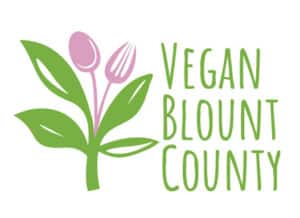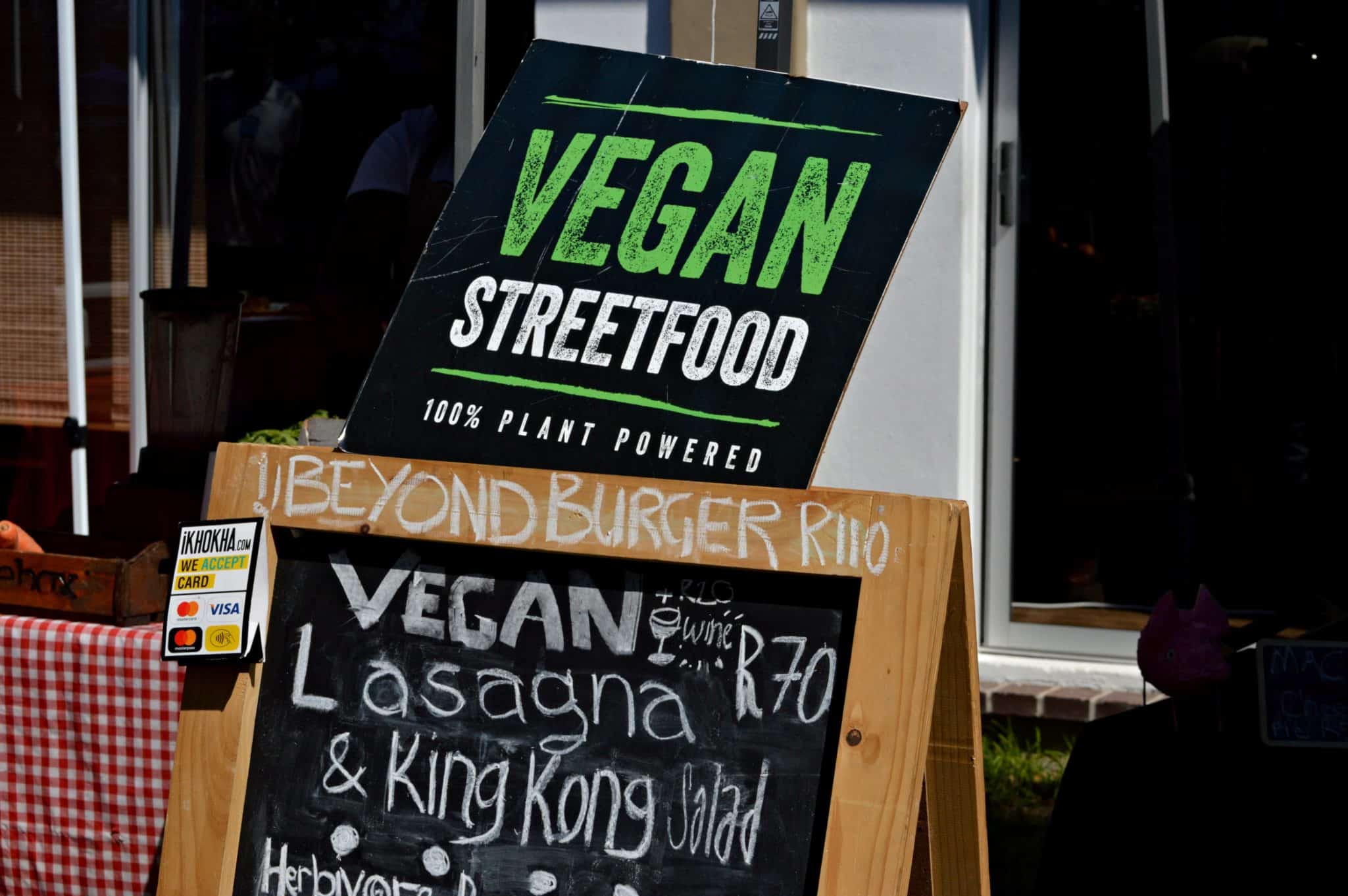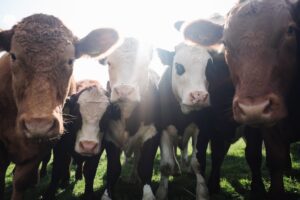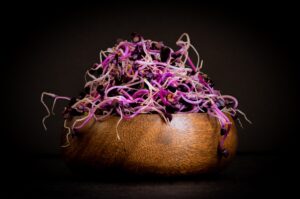- How To Learn From Melanie Joy’s Enlightening Concept of Carnism To Improve the World - June 24, 2024
- Unwrap Compassion: Unique Gifts for Vegans That Inspire and Delight - December 11, 2023
- Enjoy The Delightful Plant People Boutique: Beautiful Plants and Lovely Snacks - November 20, 2023
You haven’t missed the warning that we must save our planet from climate change.
It is a big ask. Sometimes I find it overwhelming to think of all the ways we need to change. And experts don’t always agree on the strategies that will reduce emissions. I find the Project Drawdown approach fascinating because they based their action recommendations on research. Shown below are the top five strategies.

If you focus on the Drawdown recommendations you can personally control, your best options are to reduce food waste and eat plants. Sustainable diets can help.
My Sustainable Diet Story
In my childhood, my family loved our dogs and cats but ate cows and pigs.
My brother Ron and I lived together in college, and he cooked our meals. One day my class took a tour of a university chicken facility, and as a souvenir, we got to pick one that would be killed and prepped for our evening meal. I did it. I carried that bird home to my brother so he could work his culinary magic. But it wasn’t magical because I had faced the reality of where my food comes from.
I started thinking about becoming a vegetarian. It wasn’t easy. But I stopped eating meat when I was 25.
However, for over 30 years, I continued to enjoy dairy and eggs until I saw a video about the terrible cruelty of the dairy and poultry industries. Companies hide most atrocities from the public, but I’m sure you have seen those trucks packed with chickens come down the road, spewing feathers everywhere.
I switched to an entirely plant-based diet. And it was so easy; I was sad I hadn’t done it decades ago.
Sustainable Diets Are an All-purpose Solution
 My story is about reducing meat consumption to avoid animal cruelty. Factory farming of animals is terrible for our environment. Factory farming generates 14.5% of global greenhouse gas emissions, greater than all transportation combined.
My story is about reducing meat consumption to avoid animal cruelty. Factory farming of animals is terrible for our environment. Factory farming generates 14.5% of global greenhouse gas emissions, greater than all transportation combined.
Yes, buy a Prius and use less air conditioning, but the best thing you can do for our environment is eat plants. And, besides helping to mitigate climate change, reducing meat consumption has other benefits.
Your Health
Health and weight management are the #1 reasons people choose a vegan diet. We do not need meat and dairy to be healthy. The opposite is more likely. People who eat meat have higher death rates, cardiovascular disease, colorectal cancer, and type 2 diabetes.
Pollution
Factory farming of animals uses about 70% of our agricultural land and is one of the leading causes of deforestation, biodiversity loss, and water pollution.
Food Justice
Factory farming of animals is a food justice issue. Like coal plants and hazardous waste sites, factory farms are never located in neighborhoods with high socioeconomic status. That means they subject poor people to the impact of the factory farms’ smell, noise, and water pollution.
Most people don’t want to work on factory farms or in slaughterhouses. So the most vulnerable people end up working there and suffering the terrible physical and mental impact of killing thousands of animals daily.
Erik Marcus at Vegan.com has an excellent piece called Why Go Vegan? The Top Reasons Explained.
How To Get Started
Our society has succumbed to what author Melanie Joy calls the Three Ns of Justification: that eating meat is normal, natural, and necessary. Remember, it used to be normal to keep African people enslaved, deny women the vote, and stone women they suspected of infidelity. But cultures evolve and change what is considered normal, natural, and necessary. It is time for us to change.
Factory farming of animals is not ‘normal, natural, or necessary,’ despite the best efforts of lobbyists, public relations firms, and even our government to convince us otherwise.
But what you eat is a personal choice because it is complicated. We’ve been told all our lives that eating animal products is normal, natural, and necessary. But it is time to try something different.
Try Reducing or Eliminating Meat for a Month
There are excellent resources at Meatless Mondays. And if you’d like a more structured approach, you can wait until the first of the year and take the Veganuary Challenge.
Go Out for a Vegan Meal
Your options for local vegan food are better if you are near a large city, but you never know what small communities have to offer. To locate a vegan-friendly restaurant anywhere in the world, try the Happy Cow app.
Make a Vegan Meal
It’s not just tofu anymore. There are many excellent options for replacing meat, dairy, and eggs in your grocery store.
I recommend that you veganize your favorite meals. For example, if you like breakfast sandwiches, make one from Gardein sausage patties, Just egg and vegan cheese.
If you love lasagna, try it with vegan cheese. Miyoko’s brand is delicious.
Enjoy Organic and Locally Sourced Food
Grow organic food in your garden, or source your food locally through farmer’s markets.
Give Yourself a Lot of Grace
Your eating habits are ingrained, and changing those habits requires effort. When you pick up your fork, think about the many ways you can make a difference by avoiding meat. Think about changing your normal. And give yourself a lot of grace during your journey.
Check out Virginia Messina’s Vegan Nutrition Guide.
Environmental Activism
If environmental activism is the cause closest to your heart, there are many ways you can make a difference, even if you choose to eat meat. In my 5-step activism path, you match your gifts to activism that motivates you. So you decide how to support environmentalism in a way perfect for you. Here are some examples:
- Write a letter to the editor about increasing biking lanes to reduce your carbon footprint.
- Start a community garden.
- Reduce your consumption by using your social media savvy to share resources with neighbors.
- Make your community aware of the potential impact of factory farms in your area.
Other Resources on Sustainable Diets
My favorite site for vegan information is Vegan.com.
My favorite resource for plant-based nutrition is NutritionFacts.
Do you have a vegan family member or friend that needs a gift? Here is a guide.
At the Intersection of Thanksgiving and a Vegan Rapper
My Big Fat Italian Veganfest (And My Small Skinny Scruffy City One)




